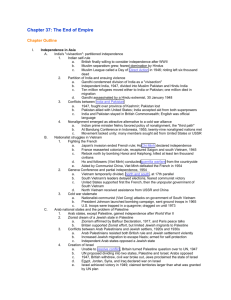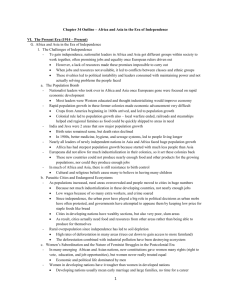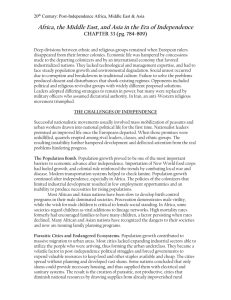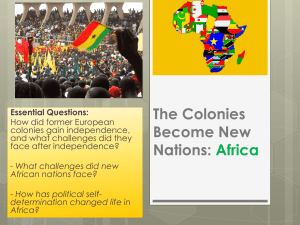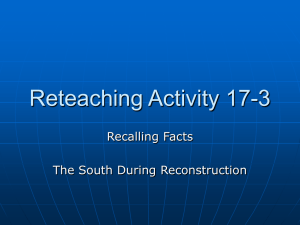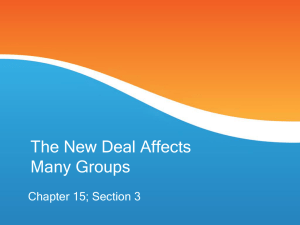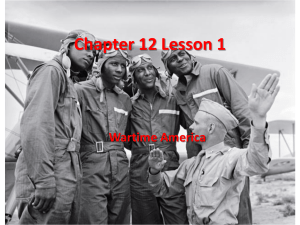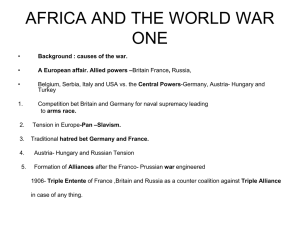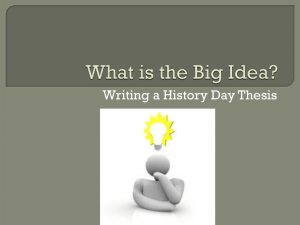The Retreat From Empire
advertisement
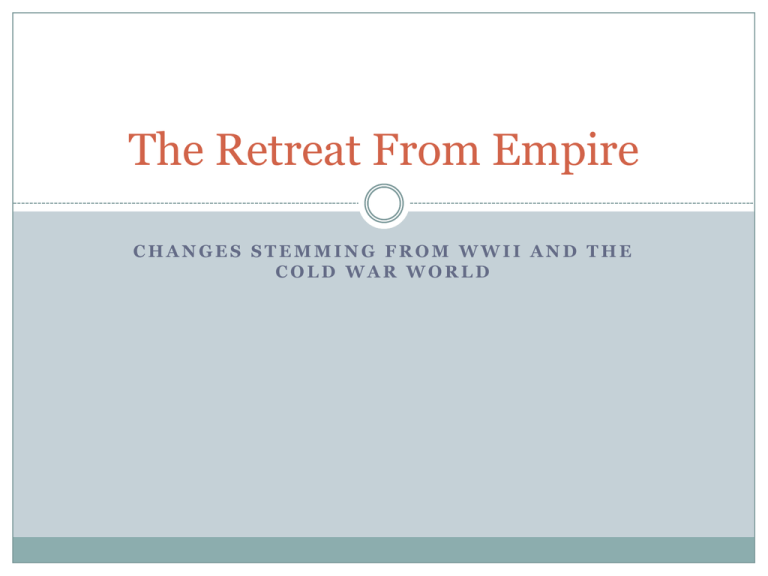
The Retreat From Empire CHANGES STEMMING FROM WWII AND THE COLD WAR WORLD India and China as symbols WWII brought substantial change to these states. India emerged as Independent in 1947. British colonial prowess receded as it focused on reconstruction after WWII China saw a long civil war emerge with global powers supporting each side in the Chinese Civil War. The US and Soviet Union sought to protect their interests during the civil war with the US supporting the nationalists and the Soviets supporting the Communists. De-Colonizaton Global conferences emerge to try and solve the issue—Geneva Conference created a divided Vietnam in the wake of Vietnam. The French legacy in Vietnam was remembered in their future struggle. Vietnam had their own designs on their future. The lessons from China ring true in Vietnam Two states, two supporters…US in South, USSR in North. Proxy war that results in a war of independence as Vietnam will become a communist state. Case Studies in De-Colonization Israel: 1917 Balfour Declaration A British mandate after WWI Remnant of the Ottoman state Created its own state in 1947 Zionism and Palestinian outrage De-Colonization in Egypt Egypt and Arab nationalism Military leaders under Gamal A. Nasser seized power in 1952 Nasser became prime minister, a leader of pan-Arab nationalism Egypt neutral in cold war, accepted aid from both powers Nasser dedicated to ending imperialism and destroying state of Israel Suez crisis, 1956, greatly enhanced Nasser's prestige Canal controlled by Britain; Nasser nationalized it to build Egypt's economy Attacked by British, French, and Israeli forces, which retook canal Both superpowers condemned military action, forced them to withdraw Suez crisis divided United States and its allies in western Europe De-Colonization in North Africa Forcing the French out of north Africa France in Africa 1950s and 1960s, French granted independence to all its African colonies except Algeria Two million French settlers in Algeria Revolt of May 1954 was repressed by French; eight thousand Algerian Muslims died War in Algeria, 1954-1962 Algerian nationalists pursued guerrilla warfare against French rule By 1958, a half-million French soldiers were committed to the conflict Atrocities on both sides; heavy civilian casualties; Algerian independence, 1962 Black Nationalism and Independence Growth of African nationalism Began as grassroots protest against European imperialism African nationalism celebrated Negritude (blackness), African roots Obstacles to African independence Imperial powers assumed Africans were not ready for selfgovernment White settlers opposed black independence Anticommunist fears justified interference in African politics Economic and political instability often hampered post independent Africa Transformation of South Africa Gained independence in 1901, but denied civil rights to black population South African economy strong, both mining and industry; prospered during WWII Black workers demanded political change Apartheid: harsh legal system imposed in 1948, designed to keep races separate 87 peercent of South African land was for white residents, others classified by race African National Congress, led by Nelson Mandela, launched campaign to protest apartheid Severe government repression provoked international opposition after 1960 Black agitation and international sanctions brought end to apartheid in 1989 1994, under new constitution, Mandela won free election as first black president African Troubles Democratic Republic of Congo (Zaire) First prime minister, a Marxist, killed in a CIA-backed coup, 1961 Dictator Mobutu ruled from 1965 to 1997; plundered Zaire's economy Mobutu ruled Zaire in dictatorial fashion and amassed huge personal fortune Lawrence Kabila ousted Mobutu in 1997, changed country's name back to the Congo Kabila killed, 2001; replaced by his son Joseph; no elections yet Developing economies of Africa Africa has 10 percent of world's population but less than 1 percent of industrial output Rich in minerals, raw materials, agricultural resources Lacking in capital, technology, foreign markets, and managerial class Rapid population growth compounds problems Ghana (Gold Coast) first to gain independence, 1957 Kwame Nkrumah, nationalist leader, jailed and censored for political actions Eventually released, Nkrumah became Ghana's first president, 1957 Side-by-side posters presented Queen Elizabeth and Nkrumah as equals, 1961 Anticolonial rebellion in Kenya Violent clashes between native Kikuyu (Mau Mau) and European settlers after 1947 1930s and 1940s, Kikuyu pushed off farm lands, reduced to wage slaves Labeling Mau Mau as communist subversives, Britain gained U.S. support Kikuyu uprising crushed by superior arms in 1955; twelve thousand Africans killed Political parties legalized, 1959; Kenya gained independence, 1963 Changes in Iran The Iranian revolution, 1979 CIA helped anticommunist Shah Mohammed Pahlavi gain power, 1953 Repressive rule overthrown by Islamist followers of Ayatollah Khomeini, 1979 Khomeini attacked United States for support of the shah Militants held sixty-nine Americans hostage for 444 days; shut down U.S. military bases Movement encouraged other Muslims to undertake terrorist actions Islamofacism Islamism: revival of Muslim traditions Reasserting Islamic values in Muslim politics Resentment at European and American societies Extremists embraced jihad, or duty to defend Islam from attack; justified terrorism
